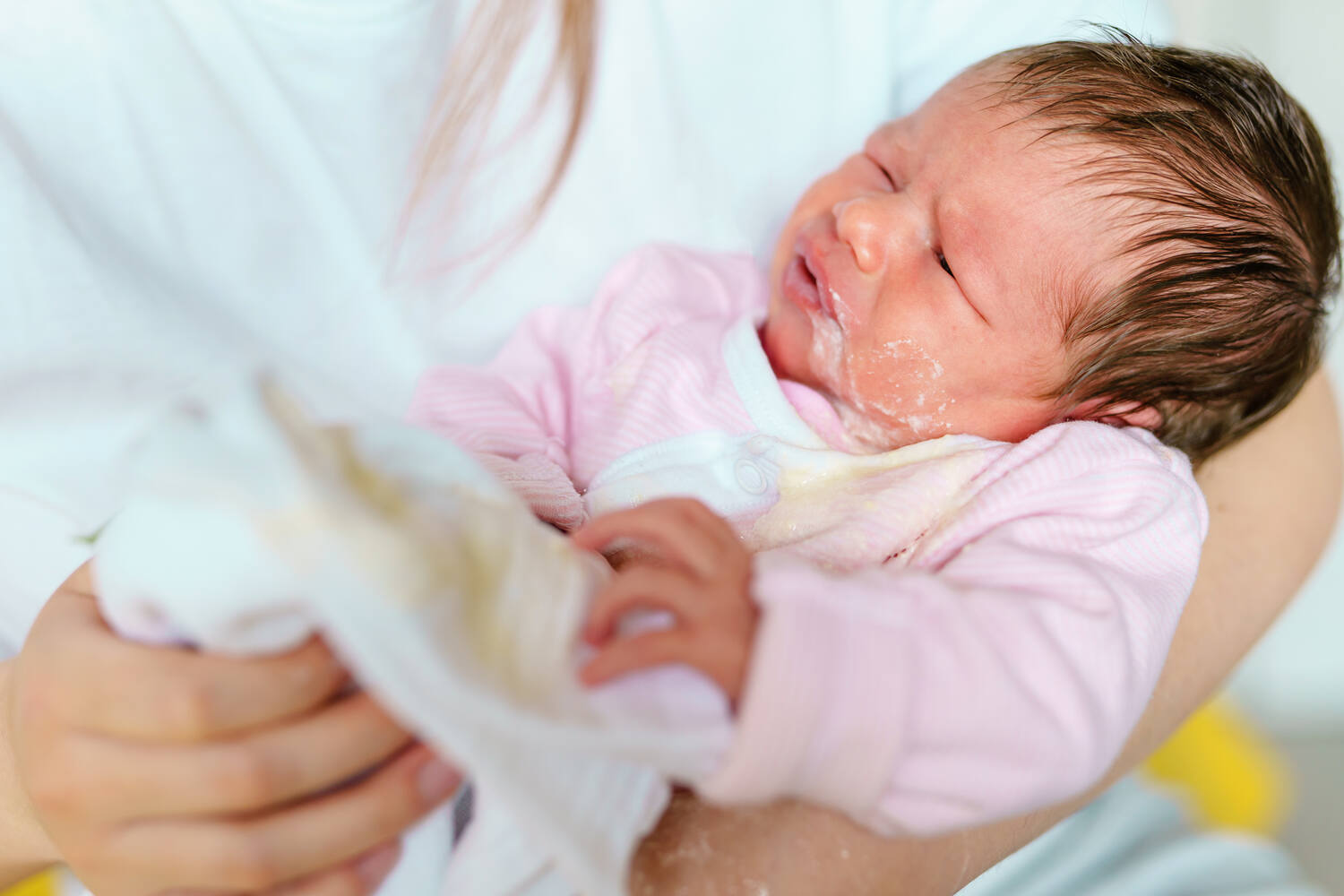
Snoring In Babies – Causes, Side Effects and Treatment by Dr. Srikanta J T
7 min readWritten by Editorial Team


It is true that a baby sleeping is apparently the most adorable sight in the world. According to some estimates, nearly 10% of babies make different noises while sleeping. In most circumstances, snoring in babies is nothing to be concerned about.
Often, it happens due to immaturity and constricted airways being overfilled with mucus, an issue that usually resolves as the airways develop. However, does snoring in baby’s point to any underlying condition that needs medical attention? Continue reading to know more about snoring in babies.
In This Article
- Why do Babies Snore?
- Causes of Snoring in Babies That Need Medical Attention
- Side Effects of Snoring in Babies
- How to Ease Your Baby’s Snoring?
- Do Snoring Babies Become Troubled Children?
- Top 3 Remedies For Snoring Babies
- When Should You Consider Visiting a Doctor?
- FAQ’s
Why Do Babies Snore?
Snoring happens when there is some sort of blockage of airflow through the baby’s nose and throat. This can happen due to:
- Stuffy nose
- Underdeveloped airways
- Upper-respiratory infections like colds
- Sometimes the infant snores only during deep sleep. This happens when the muscles in the baby’s throat become relaxed, and the baby makes a snoring sound.
Causes of Snoring in Babies That Need Medical Attention

Some more significant problems that can cause snoring in infants include:
1. Apnea of Infancy
Apnea refers to the temporary interruption of breathing. Infant sleep apnea is a sleep-linked breathing disorder. It occurs in babies who are less than one year of age. It involves reduction and a temporary break in breathing that occur in the course of the baby’s sleep.
2. Deviated Septum
A deviated septum happens when the nasal septum (the part that divides the nasal cavity of the nose in half) of the baby considerably deviates from the center, making breathing difficult. This often gives rise to loud breathing and snoring during sleep.
3. Asthma
Snoring in babies is predictive of a child developing asthma. Studies have shown that children with asthma are two times more likely to snore than the ones without asthma.
4. Apnea of Prematurity
Apnea of prematurity is a problem that occurs in premature babies born prior to 34 weeks of pregnancy. Owing to their underdeveloped respiratory system, a premature baby develops breathing issues. This results in snoring. Continuous and close monitoring of the baby is essential in such a situation.
5. Enlarged Tonsils
Even though it very rarely happens in babies and newborns, tonsillitis can be a reason behind snoring in babies. This condition is also called obstructive apnea. Gasping and labored breathing is also associated with snoring, as enlarged tonsillitis blocks the airways while sleeping.
6. Laryngomalacia
This is a condition in which floppy tissue falls inward into the airway when a baby breathes in. Floppy tissue is a soft, immature cartilage present above the vocal cords. Laryngomalacia causes the baby to snore loudly.
7. Abnormalities in the Throat
Any unusual movement of the palate (the roof that separates the oral cavity from the nasal cavity) can give rise to snoring in babies. Likewise, throat abnormalities like cysts can cause snoring in babies.
[Read : Sleep Apnea in Babies]
Side Effects of Snoring in Babies
Babies who snore habitually are likely to develop the following problems in the long term:
- Poor memory and concentration
- As they grow up they tend to develop more social issues
- Are more anxious and irritable
- Show symptoms of depression
- Less active and want to sleep during the day
- Cognitive dysfunction
How to Ease Your Baby’s Snoring?
If snoring is due to any underlying cause, as mentioned above, treating that particular concern can help solve the snoring problem in babies. If the cause is insignificant, like blocked nose and underdeveloped airways.
Here are some tips to help to ease snoring in babies:
1. Use a Nasal Aspirator

After taking out lingering secretions like mucus from your baby’s nose with the help of a nasal aspirator, use a saline nasal spray at least twice a day. This will help to clear the nasal passage and ease the baby’s snoring issue.
2. Changing Baby’s Sleeping Position
Gently changing the sleeping position of your infant is another method to ease the problem of snoring. First, find out in which position your infant is snoring more and which position helps your little one to breathe easily. Try to maintain that position by gently turning the baby if the baby prefers to sleep in the wrong position.
3. Inclining Position
Place a pillow under your baby’s mattress. Inclining your baby’s head while sleeping could help get rid of congestion and clear up the airways and thus prevent snoring.
4. Get Rid of Possible Allergens
Most importantly, ensure that your baby’s room is allergy-proof. Remove dust collectors, like carpets and thick curtains, from your baby’s surroundings.
5. Using a Humidifier
If snoring is due to a blocked nose, using a humidifier in your baby’s room will help to ease the issue of snoring. Likewise, standing in a warm shower with your baby helps to loosen excess mucus in the airway. Remember to do it just before bedtime so that your little one has a sound sleep, and it eases snoring.
[Read : Are Nasal Sprays Safe For Kids?]
Do Snoring Babies Become Troubled Children?
As parents, we often associate snoring in babies with deep sleep. But studies have shown that snoring along with mouth breathing and sleep apnea are symptoms of sleep disorder in babies. These symptoms can predict problems in a child’s emotional and behavioral well-being in the long run.
Research studies suggest that babies who are around 6 months and have sleeping issues are 20% more likely to develop behavior problems like hyperactivity, etc., by the time they reach the age of 7. So it is necessary that you speak to your pediatrician about consistent snoring in your infant.
The pediatrician will assess your child’s symptoms and suggest a mode of treatment that will help to reduce the risk of your baby developing any social or emotional concerns later in life, and also have a peaceful and quiet sleep at night.
Top 3 Remedies For Snoring Babies
Your baby’s snoring may be due to a medical or congenital condition that needs to be treated. Nevertheless, if it is caused by something else like a blocked nose, you can always try some home remedies.
To prevent colds, nasal congestion, and other respiratory problems, keep your baby’s room clean and dust-free. Snoring in infants can be caused by any of these problems. Also, refrain from using thick carpets or heavy curtains, which attract dust.
Here are some remedies you can try to stop your infant from snoring:
1. Change Your Baby’s Sleeping Position
While your baby is sleeping, try to change his/her position. Snoring is common when infants are asleep on their backs or tummies. Infants who sleep on their sides are less likely to snore. Also, try to tilt the baby’s head frequently from one side to the other. Your baby may sleep better when his head is gently inclined with a pillow. This will help ease congestion and snoring.
2. Clean Your Baby’s Nose Regularly
Regular cleaning of the baby’s nose with an aspirator can eliminate the mucus inside the nose and clear the nasal passages, which is a major cause of snoring. After consulting a pediatrician, you can also administer the saline spray (as directed).
Likewise, steam inhalation will also help. Stand in your bathroom holding your baby. Run a warm shower with plenty of steam. Steam will remove any blockage in your baby’s airways once it gets into his or her airways.
[Read: Effective Ways To Clean Baby’s Nose]
3. Invest in a Humidifier

The dry indoor air tends to irritate a baby’s immature airways. Placing a humidifier in the baby’s room will help. A humidifier helps maintain the humidity of the room at optimum levels. It will help the infant breathe better while he sleeps, reducing his snoring and snorting.
When Should You Consider Visiting a Doctor?
There is usually nothing to worry about when it comes to babies snoring. However, it is important to talk to your baby’s pediatrician if the snoring is getting worse with time and the infant is experiencing other underlying health issues.
You must take your baby to the doctor as soon as you observe any of the following symptoms:
1. Excessive Snoring and Snorting
You should be concerned if your infant snores or snorts every time they sleep for prolonged periods of time.
2. Abnormal Breathing
It is very important to take your infant to the doctor if you notice that the breathing stops snoring, no matter how briefly. Even for such a short period of time, not breathing can adversely affect a Baby’s internal organs.
3. Extremely Loud Snorting and Snoring
Snoring and snorting loudly is not normal for babies, so it’s important to address the problem. Your baby’s pediatrician can help you find out why he or she is snoring so loudly.
4. Sleep Disruption
A lack of sleep caused by snoring should be treated medically. Sleep deprivation can impact a baby’s growth and development in many ways.
FAQ’s
1. How Can I Stop My Baby Snoring Naturally?
Snoring can be reduced if the baby sleeps on its side. Eliminating stuffy nose will also reduce snoring.
2. Is It Normal For A 1-Year-Old To Snore Loud?
One-year-olds snore once in a while. No need to worry about it. However, if snoring is frequent, severe, and loud, this could indicate a breathing disorder.
3. Does Snoring Affect Babies’ Sleep?
It depends on the root cause. Mild snoring has little impact on infant’s quality of sleep. Snoring caused by enlarged tonsils and adenoids, on the other hand, can negatively affect a baby’s sleep.
Mommies, did your baby snore at night? What did you do to help your baby overcome this problem? Do share your experiences in the comments section below.
Read Also: Tonsillitis In Children

Editorial Team,
With a rich experience in pregnancy and parenting, our team of experts create insightful, well-curated, and easy-to-read content for our to-be-parents and parents at all stages of parenting.Read more.
Responses (0)
Want curated content sharply tailored for your exact stage of parenting?
Related articles

Top 9 Best Black and White Books For Newborn Babies

Tips and Ideas For Selecting Baby’s First Birthday Dress For Boys

Sex After C-Section – Is it Safe and When to Have

Baby Spitting Up Mucus – Is it Normal?

Can Babies Eat Pickles – When and How to Introduce

Life With PCOD After Marriage – A Complete Guide
Sponsored content
Discover great local businesses around you for your kids.
Get regular updates, great recommendations and other right stuff at the right time.





